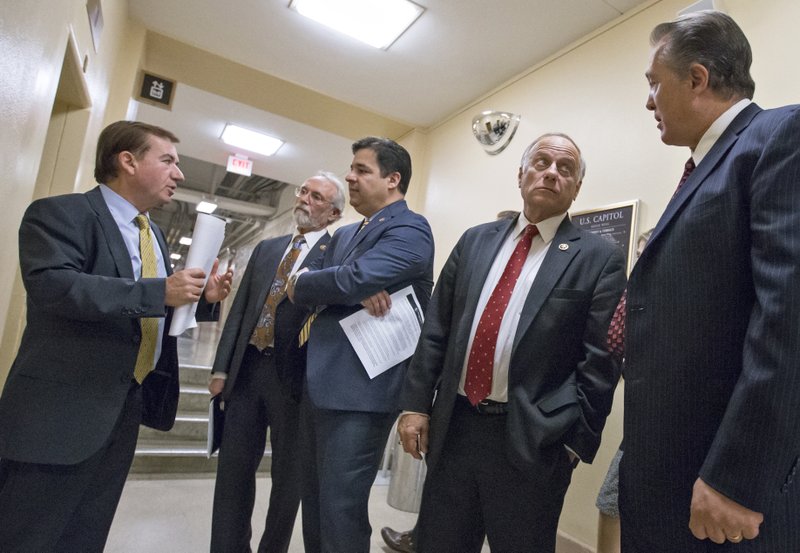WASHINGTON -- The White House on Wednesday threatened a presidential veto of House Republican legislation aimed at increasing screenings for Syrian and Iraqi refugees before they enter the United States, calling requirements in the bill "untenable."
RELATED ARTICLES
http://www.arkansas…">Cotton: Halt law on phone warrants http://www.arkansas…">8 nabbed in French raid http://www.arkansas…">ISIS threat pulls 2 closerhttp://www.arkansas…">ISIS fighters said to buttress city, hide in homes http://www.arkansas…">Arkansas opened arms to him, Syrian says http://www.arkansas…">Photo said to be of airliner bomb http://www.arkansas…">Honduras detains 5 Syrians who carried stolen passports
The legislation, which sets high hurdles for refugee admissions, including FBI background checks and individual sign-offs by top federal officials, "would provide no meaningful additional security for the American people, instead serving only to create significant delays and obstacles in the fulfillment of a vital program that satisfies both humanitarian and national security objectives," the White House said in a statement.
President Barack Obama will veto the legislation if it reaches his desk, the statement said.
Republican leaders, eager to respond quickly to Friday's terror attacks in Paris, had described the bill as a middle-ground approach. It institutes tough new screening requirements but steers clear of demands from some Republicans, including presidential candidates, for religious questioning or a complete end to the U.S. refugee program. It is scheduled for a House vote today.
"This is common sense. And it's our obligation," Speaker Paul Ryan of Wisconsin said on the House floor. "If the intelligence and law enforcement community cannot certify that a person presents no threat, then they should not be allowed in."
In the Senate, lawmakers emerging from a closed briefing with administration officials Wednesday night said Sens. Dianne Feinstein, D-Calif., and Jeff Flake, R-Ariz., planned to introduce a bill that would restrict visas for anyone who had been in Iraq or Syria in the past five years.
Sen. Dick Durbin, D-Ill., said Republicans are focused on a refugee program that is "serious and arduous," but 20 million foreign visitors come to the U.S. with visa waivers with no fingerprinting or background vetting.
"Now that has to be reformed," he said.
About 2,200 Syrian refugees have been allowed into this country in the past four years, and they already go through a vetting process that can take as long as three years and includes biometric screening, fingerprinting and additional classified controls. The House bill would add a requirement for the Homeland Security secretary, along with the head of the FBI and the director of National Intelligence, to certify that each refugee being admitted poses no security threat.
The FBI also would be put in charge of creating a way to conduct a "thorough background investigation" of refugees fleeing chaos and horror. Although Syrians tend to be heavily documented, Democrats questioned how such an investigation could be accomplished.
Democratic leaders also complained of changes to the bill that they said would have the practical effect of keeping refugees out of the U.S. entirely.
"Some in Congress intend to use this tragedy to shut down the U.S. refugee program, turning our backs on victims," Democratic Reps. Adam Schiff and Zoe Lofgren of California and Bennie Thompson of Mississippi said in a joint statement.
Meanwhile, Republican governors are demanding the White House suspend plans to resettle refugees in their states, saying that screening challenges make it all but impossible to identify terrorists among those seeking refuge in the U.S.
"We have the independent authority to completely shut down these refugee relocation programs," Texas Gov. Greg Abbott said in an interview on the first day of the Republicans Governors Association's two-day meeting in Las Vegas. "The states are saying we are not going to accept any more of these refugees until the United States comes up with an effective vetting program."
In Europe, the debate over refugees has centered on a passport found near the body of an assailant in the Paris attacks.
The passport bearing the name of Ahmad Al Mohammad, 25, was found near one of the suicide bombers who blew himself up outside the Stade de France. It indicates that he entered Greece from Turkey on Oct. 3 and later passed through Serbia and Croatia, getting registered in each new country. The passport's authenticity has not been determined, but fingerprints of the attacker match those taken by Greece and Serbia. The other attackers who have been identified so far are European citizens.
Authorities are also noting that the vast majority of migrants do not bother to get their passports registered along every step of their journey. German Interior Minister Thomas de Maiziere has said there is evidence the passport is "a trail that was intentionally laid."
"At the very least it's unusual that such a person was faithfully registered in Greece, Serbia and Croatia, even though we're usually pressing for registration to take place and lament that it isn't always done properly," de Maiziere said Tuesday.
Information for this article was contributed by Julie Pace, Alan Fram, Vanessa Gera, Steve Peoples and staff members of The Associated Press.
A Section on 11/19/2015

